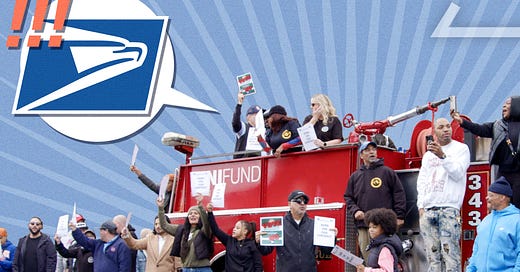USPS Workers Are Fed Up and Fighting for a Better Deal
Postal workers were left without a contract for more than a year, and many think the offer they got is unacceptable. Now they’re revolting.
By Paul Blest and Jordan Zakarin, More Perfect Union
There’s an uprising happening across the U.S., and it involves worsening job conditions, opaque backroom negotiations, and hundreds of thousands of letter carriers in American cities and suburbs who want a better deal.
Despite the promise of a historic contract, more than 225,000 workers in the National Association of Letter Carriers have been working without one since May 2023 — more than 500 days. But last month, when NALC President Brian Renfroe brought a tentative agreement to the membership that had been negotiated with Postmaster General Louis DeJoy, workers were left frustrated by raises of 1.3 percent — just $0.20 for city carrier assistants making $19 an hour.
Now, angered by subpar wages in a job that’s grown only more demanding in recent years, many letter carriers want to reject the deal.
“Everyone's already pissed. Everyone's already on edge,” Jonathan Morris, a postal worker in the Fort Worth area, told More Perfect Union. “And then this contract's taking way too long. People got kids going off to college, or they're trying to buy a house or they got a kid on the way.”
“We're all looking for something that was a win,” Morris said. “Because all of this looks like concessions.”
Letter carrier jobs were once a rare pathway to the middle class. But over the past 30 years, and with increasing intensity over the past decade, the job has become more stressful and dangerous. Attacks on carriers doubled between 2019 and 2023. And even as heat exhaustion has become more prevalent, letter carriers face demands to cover more ground in less time in vehicles with no air conditioning. (The tentative agreement includes a requirement for the USPS to purchase vehicles with air conditioning.)
“We have people that faint, pass out, and die, because of this heat,” Corey Walton, a longtime letter carrier in Nashville who hosts a podcast for union members called “From A to Arbitration,” told More Perfect Union. “Management starts sending on these scanners: keep it moving, beat the heat, no breaks, no additional breaks. Keep it moving, beat the heat.”
On top of worsening conditions, wages have remained stagnant. Some letter carriers are sleeping in their cars, and one local in Brooklyn even built a shower for workers in their office after one worker lost housing. Others have struggled with bills.
“My bills just kept adding up because interest rates keep going up,” Matthew Copson, a letter carrier in Cincinnati, told More Perfect Union. “The amount of compensation…that I'm getting from the post office just isn't enough.”
We spoke with letter carriers across the country to find out how worsening conditions have made what was once a stable public service job into a week-to-week paycheck. What we found was a group of essential workers who are channeling their frustration into action for a better contract and a better workplace.
“It's not the agency people love. It's the mailman and the mailwoman, the mailperson. The letter carrier delivering their mail, bringing 'em their social security checks, bringing their letters from their grandson,” Morris said. “Not the management who sits in their chair abusing people all day.”




The USPS is constrained by what it can spend by only receiving revenues from postage. Ithas to be self-sustaining without tax help.
The only way these workers could get more pay is if there are fewer of them.
Increasing hiring standards, paying on a performance (more accurate work per individual), and eliminating Saturday deliveries may help greatly.